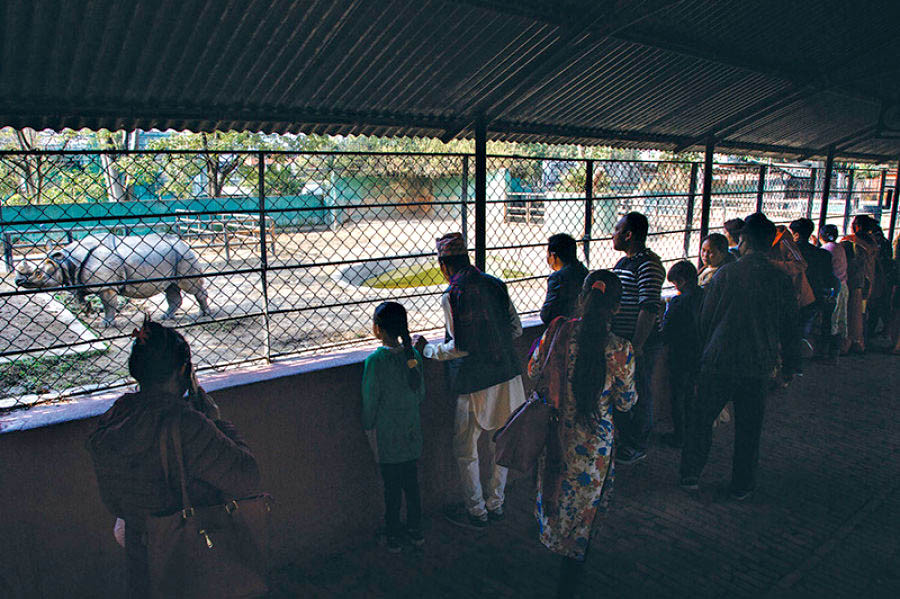National
Covid-19 restrictions once again worry Central Zoo officials
They fear they won’t be able to feed the animals if the lockdown continues.
Chandan Kumar Mandal
Once again, the Central Zoo is staring at a tough time ahead as its major source of income, which comes from visitors, has dried up due to the Covid-19 restrictions. Zoo officials are worried about how to feed the hundreds of captive animals amid the paucity of funds.
With the pandemic raging and the entire country under prohibitory orders, the Central Zoo in Jawalakhel, Lalitpur, remains closed since last month.
Since April 29, the Kathmandu Valley has been under prohibitory orders with all non-essential activities and travel banned.
“The zoo remains shut since the imposition of the prohibitory orders,” said Chiranjibi Pokharel, chief of the zoo. “Also during the first wave of the pandemic last year, we suffered immensely due to the months of lockdown. Now, let’s see what happens in the coming weeks.”
The first lockdown had come as a big shock for the zoo officials as they struggled to feed the animals amid huge losses of income. Officials had approached the government for funds to sustain the zoo’s operations.
Spread over six hectares, the zoo hosts 1,160 individual animals of 110 species—mammals, birds and reptiles among others. The zoo needs Rs30 million annually for taking care of these animals and other operations of the facility. It was established as a private zoo in 1932 by Rana Prime Minister Juddha Samsher.
“Until now, we have been able to feed the animals,” said Pokharel. “However, if the prohibitory orders continue like last year, we will again face a severe shortage of funds leaving us struggling to feed the animals.”
Hit hard by the last year’s lockdown and following restrictions order, the zoo authorities had approached the government and others for financial support.
When it opened after nine months of closure in December, the zoo came up with new guidelines that placed restrictions on the number of visitors allowed every day and enforced a cap of only 800 visitors inside the zoo at any point of time.
Besides imposing safety protocols that include wearing of masks, using sanitiser and limited visitors, it also switched to online ticketing from the traditional ticket sales in a bid to avoid crowding at the entrance.
But, visitors arrival still remained lower than the pre-pandemic days when the zoo would welcome around 3,000 to 4,000 visitors every day.
“We recorded a significant drop in the number of visitors coming to the zoo. Compared to the pre-pandemic times, only around 30 to 35 percent people visited the zoo after it was reopened in December,” said Pokharel.
Besides, in an attempt to sustain itself and recover the losses caused by the lockdown, the zoo had launched a campaign called, ‘Adopt an Animal’ in March this year.
Under the year-long programme, anyone can adopt an animal from the Central zoo and make a monetary contribution for their feeding, enrichment, nourishment and medication for one full year. The zoo has kept all its animals on the adoption list, however, with a special focus on species like one-horned rhino, Asian elephant, royal Bengal tiger, hippopotamus, sloth bear, gharial crocodile and red panda among others.
“Many people have expressed commitment to adopt the animals. We have also been approaching such people. But the campaign has not been as successful as expected,” said Pokharel. “Hopefully, things will improve in the coming months. Among those who committed support, some have made the payments and others are slowly sending their support. It will take some time. Around 50 individuals and businesses have pledged support and we are in touch with them.”
When the zoo, which has been managed by the National Trust for Nature Conservation since 1995, was struggling to sustain itself last year, Lalitpur Metropolitan City had supported Rs1 million. Later, the government also allocated nearly Rs 35 million for the zoo.
But the ongoing situation and the possibility of a protracted lockdown has left the zoo officials worried.
The latest prohibitory orders imposed since April 29 have already been extended until May 27.
“When the zoo was reopened for a few months after the first wave of the pandemic, it had provided some relief financially. But again, we are worried about what will happen next,” said Pokharel, the chief of the Central Zoo. “If the [prohibitory orders] continue like last year, the troubles will return and again we might have to ask the government for support.”




 22.9°C Kathmandu
22.9°C Kathmandu














